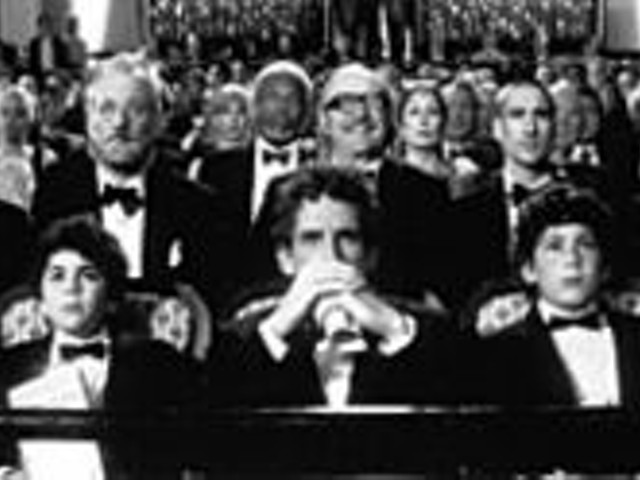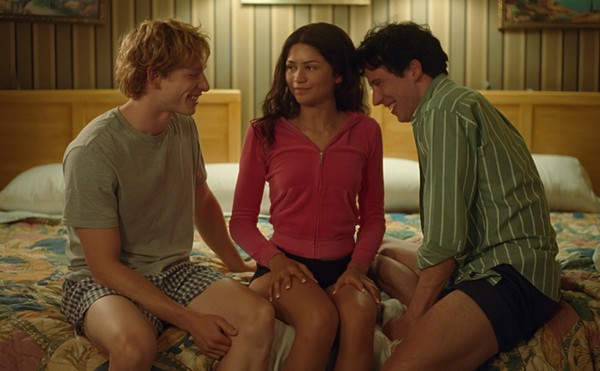In form, Gosford Park lies in the tradition of innumerable old movies (including many adapted from Agatha Christie) in which a group of people, all with their own agendas, are thrown together in an isolated country house; a murder occurs, and a savvy detective must figure out who, of the several guests with strong motives, actually committed the crime. As usual, Altman is less concerned with crafting a perfect example of the genre than he is with examining the genre itself. Neil Simon already did the ultimate parody of this stuff in the 1976 Murder by Death (in which Maggie Smith, one of the stars of Gosford Park, also appears); Altman's approach is not so much a satire as a reimagining of the genre's conventions, with the class elements emphasized.
Like M*A*S*H, Nashville, Short Cuts and numerous other Altman projects, Gosford Park drops the viewer into a complex, frantic situation with no clear-cut protagonist to cling to. The closest the film comes to a central character is Mary Maceachran (Kelly Macdonald), a demure young maid accompanying her aged employer, the snobbish Lady Trentham (Smith), for a weekend party at the summer house of crusty Sir William McCordle (Michael Gambon), whose cold-hearted wife, Sylvia (Kristin Scott Thomas), is Lady Trentham's niece.
Also in attendance are Sylvia's two sisters (Geraldine Somerville and Natasha Wightman) and their husbands (Charles Dance and Tom Hollander), plus the McCordle daughter (Camilla Rutherford); Ivor Novello (Jeremy Northam), the real-life British songwriter and matinee idol whose persona Altman and screenwriter Julian Fellowes have borrowed for the film; and his guest, a Hollywood producer (Bob Balaban, who also actually co-produced Gosford Park) doing background research for the upcoming Charlie Chan in London.
If this seems intimidatingly complicated, be assured that you haven't heard the half of it. There are four more guests, whose relationship to the others continues to baffle me (after two viewings of the movie). Indeed, two of them seem so tangential to everything in the film that one can only wonder whether they are remnants of a subplot that was excised in the final cut. And we haven't even gotten to the servants yet, who are the real heart of the story.
What the servants in this world lack in money and power, they compensate for with ritual and knowledge. That is, even though they know everything that's going on in both their realm and the "upstairs" world of their wealthy and titled employers, the latter know very little about what goes on "downstairs." Altman is careful to show us how the "downstairs" people are omnipresent, even as they strive to self-effacingly blend in with the woodwork. On one hand, it is their pleasure and validation to serve; on the other, they are completely aware of the their bosses' utter helplessness without them.
Mary, new to service, functions much of the time as our surrogate, as the house staff -- butler (Alan Bates), housekeeper (Helen Mirren), cook (Eileen Atkins, co-creator of Upstairs, Downstairs, to which the film clearly owes a debt), footmen (Richard E. Grant and Jeremy Swift) and head housemaid (Emily Watson) -- explain to her the insane rules mandated by tradition. They inform her that visiting servants will be addressed only by the names of their employers, effectively stripping them of any other identity; likewise, each will have his or her seat at dinner determined by the employer's rank.
If there is a problem with Gosford Park, it's that Altman seems so enthralled with the interplay of the characters that he's reluctant to put much energy into the mystery itself. The murder doesn't occur until somewhere past the midway point. And the "brilliant" inspector (Stephen Fry) is so totally imbecilic, so broadly portrayed, he seems to have wandered in from a different film altogether, quite possibly Murder by Death. Still, there is a payoff on the murder, one inextricably integrated with all the class interactions the movie has set up so carefully.
As is always his style in his ensemble films, Altman has his cameramen prowl a set in which numerous events are unfolding simultaneously; he often seems to concentrate on the most trivial (if absorbing) activities, while the important stuff is going on in the background or solely on the soundtrack. It's a canny technique, particularly for a mystery: We never know whether the highlighting of certain things is important.
Altman's technique also allows his huge cast to act up a storm, in the best sense. Gosford Park has roughly half the best actors in England in it; in addition to those mentioned above, it features Derek Jacobi, James Wilby and Clive Owen. (American heartthrob Ryan Phillippe is in there, too, and perfect for his role.) Much of the beauty of what the actors provide is not apparent on first viewing; the second time, armed with foreknowledge of who these people are and what is going to transpire, one can perceive and understand numerous little expressions and reactions whose meanings weren't apparent the first time.
It is amazing that Altman has endured this long, through all his career ups and downs. He is 76 now, and I can't think of another American director who has still turned out first-rate work at that age. (Hitchcock was 72 when he made Frenzy, Cukor 65 for My Fair Lady and Wilder 72 for Fedora, which was only first-rate for part of its length.) If Altman's last effort, last year's Dr. T and the Women, was one of his most critically reviled films ever, Gosford Park should do much to salvage his reputation.





